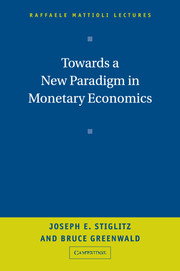Book contents
- Frontmatter
- Contents
- List of figures and table
- The Raffaele Mattioli Lectures
- Preface
- Part I The principles of the new paradigm
- Part II Applications of the new paradigm
- 8 Monetary policy
- 9 Regulatory policy and the new paradigm
- 10 Financial market liberalization
- 11 Restructuring the banking sector
- 12 Regional downturns and development and monetary policy
- 13 The East Asia crisis
- 14 The 1991 US recession and the recovery
- 15 The new paradigm and the “new economy”
- 16 Concluding remarks
- Bibliography
- Index
13 - The East Asia crisis
Published online by Cambridge University Press: 12 May 2010
- Frontmatter
- Contents
- List of figures and table
- The Raffaele Mattioli Lectures
- Preface
- Part I The principles of the new paradigm
- Part II Applications of the new paradigm
- 8 Monetary policy
- 9 Regulatory policy and the new paradigm
- 10 Financial market liberalization
- 11 Restructuring the banking sector
- 12 Regional downturns and development and monetary policy
- 13 The East Asia crisis
- 14 The 1991 US recession and the recovery
- 15 The new paradigm and the “new economy”
- 16 Concluding remarks
- Bibliography
- Index
Summary
The East Asia crisis has provided a wonderful – yet unfortunate – opportunity for testing many of the ideas presented here. The crisis demonstrated powerfully the dangers of misguided monetary theories; the alternative paradigm presented here, while it clearly could not have forestalled the downturn, might have led to policies that would have resulted in recessions that were less deep and less prolonged. The basic story of that crisis is now well known. During the 1970s and 1980s, the countries of East Asia experienced rapid economic growth – by most accounts the most rapid development any region of the world had experienced. The growth brought with it improvements in social indicators (health, education) and marked reductions in poverty. While there was some controversy over the “model” that they had pursued, it combined a strong role for government with market oriented policies. Governments had helped create financial institutions, and they were highly regulated. In the early 1990s, largely under the influence of outsiders (the US Treasury and the IMF), policies of financial and capital market liberalization were put into place. This resulted in a flood of capital coming into the countries in the region – and then a sudden reversal, a huge outflow. The magnitude of these changes in flows was enormous. In the case of Thailand, the change in flows amounted to 14 percent of GDP and in the case of South Korea 9 percent of GDP
- Type
- Chapter
- Information
- Towards a New Paradigm in Monetary Economics , pp. 261 - 275Publisher: Cambridge University PressPrint publication year: 2003

